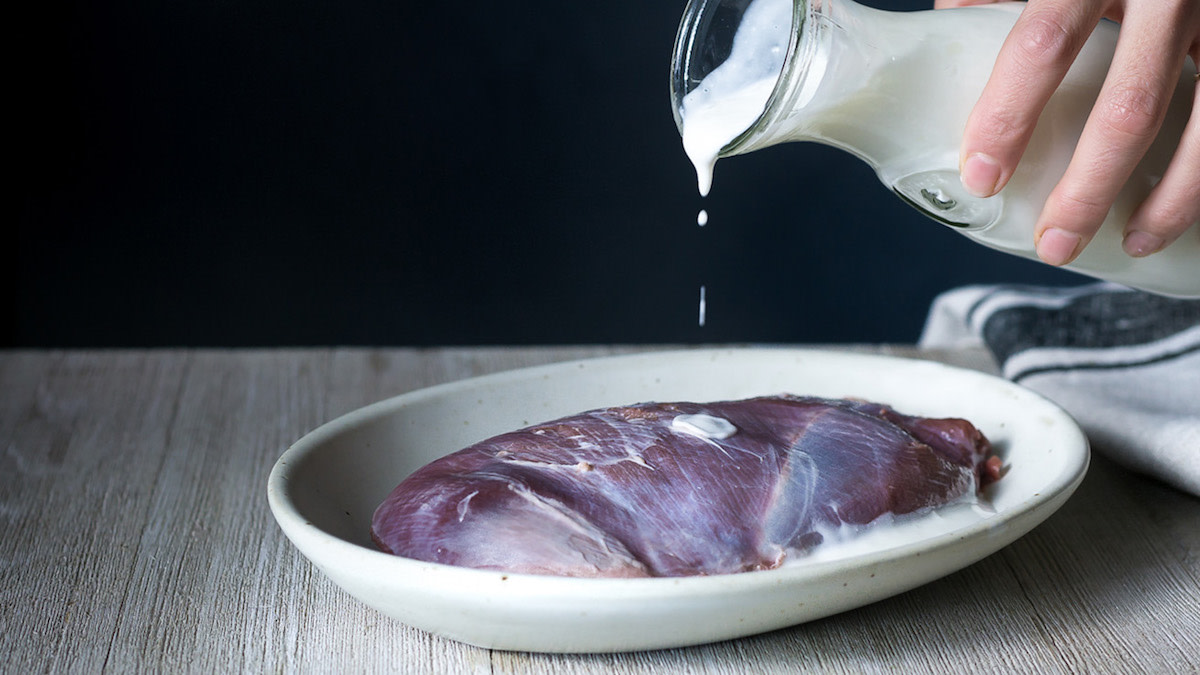Should You Soak Venison in Milk?

About a decade ago I received some backstrap to try cooking venison for the first time. This gracious gift came with precise instructions: soak the steaks in buttermilk before grilling.
I’m sure most venison enthusiasts have heard this advice before. I find that people fall in one of two categories: purists that believe soaking venison in buttermilk is sacrilege, and results-driven cooks that have witnessed the benefits of buttermilk.
This tradition has been around forever, but few know how it works and which game animals are best suited to this method.
TenderizationPlain milk is relatively neutral on the pH scale, but cultured dairy such as yogurt and buttermilk contains more lactic acid. Acids denature protein, breaking down connective tissue and softening meat by increasing water content. Dairy also contains calcium, a mineral that can activate enzymes in the muscle to assist in protein breakdown.
The problem is that marinades (including buttermilk) barely penetrate past the surface, so it can’t tenderize thick cuts like backstraps or roasts. It’s a good rule of thumb toapply marinadesonly to thin cuts and to consider them primarily as flavor enhancers.
Remember that buttermilk with red meat is not always an appropriate combination. Imagine serving duck soaked in buttermilk withItalian salsa verde—not ideal. There are better ways to tenderize and impart flavor on red meat than dairy, but don’t dismiss the idea altogether.
Buttermilk and yogurt make great marinades for white meat. You can create an Indian tandoori using turkey by marinating with a mix of yogurt, garam masala, garlic and ginger. Another great example is to soaksquirrel or rabbitin buttermilk just before frying.The point is to make sure that you’re using the dairy to enhance the dish you plan on cooking with your wild game.
NeutralizationSome folks don’t like what many identify as “gamey” flavors. If you’ve ever eaten venison that didn’t quite taste right, I’m willing to bet you’ve looked into the milk-soaking method.
If you do an internet search, you’ll find very little factual information or science behind soaking meat in milk. But the truth is, this old wives tale actually holds water. The main theory is that milk will neutralize strong flavor, purge blood, or lighten its color. After a bit of research, I continued to come across a common theme. Casein, the main protein in milk, is lipophilic (fat-loving). That means it tends to neutralize and bind to various compounds.
For example, milk is commonly used todeodorize fishy smells. All fish contain TMAO (trimethylamine oxide), a chemical that breaks down into trimethylamine, is responsible for the foul smell. Casein binds with TMA and removes odor.
This is also the same reason we add milk to coffee. Casein binds to tannins (the component responsible for bitter flavor) and strips it away. Also, because milk is relatively neutral on the pH scale, it can tone down acidic flavors. This reaction is a result of calcium acting as a buffering agent to neutralize acidity.
To better understand this, consider that you’re supposed to drink milk when eating spicy foods to help reduce the burning sensation. Casein binds to capsaicin, the oil inside of chilis responsible for the burn. The oil dissolves, almost like a detergent.
Manydifferent variables, including an animal’s age, diet and physical activity, play a role in the development of aromatic compounds. These compounds are stored in fat and give animals their distinctive character. It is my assumption that since flavors reside in fat, milk can neutralize them as a result of casein binding to those molecules. This reaction is not the same as drawing blood out of the meat the way some people believe. That is the job of a brine.
Hunters often look to milk as a way to remove make venison taste better, but I think the real solution should be determining why your meat tastes “gamey” in the first place. Buttermilk can be your ally in the kitchen, but it’s not a magical elixir to solve every problem.
Shop
Sign In or Create a Free Account
Related

Cooking Techniques
The Worst Wild Game Cooking Advice

Cooking Techniques
5 Organs You Should Save From Deer




